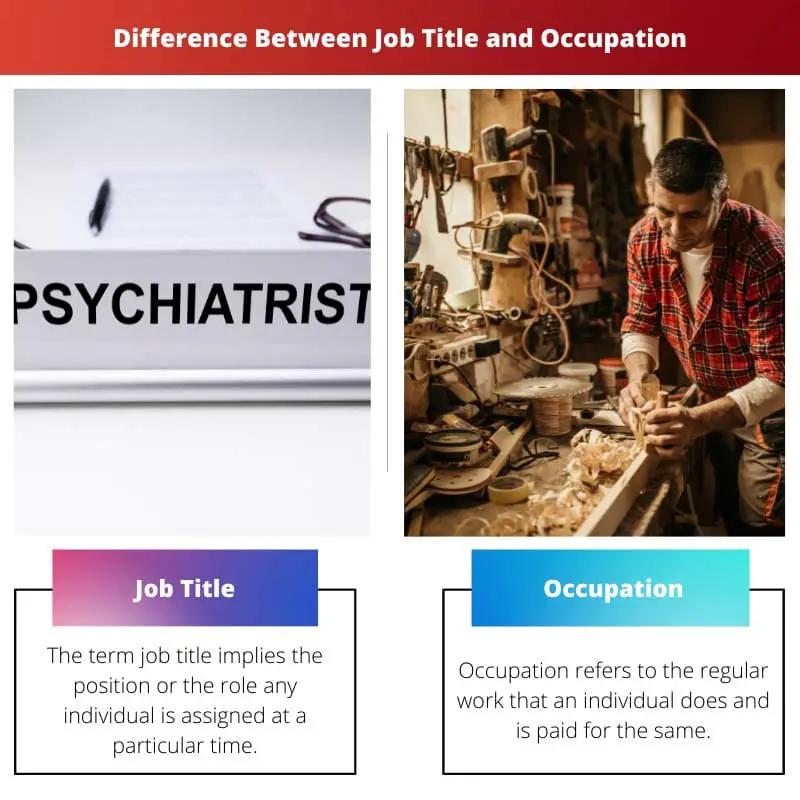Several terms are used around us to refer to broad terms like work and employment. Job title and Occupation are also one of those.
These two terms are used interchangeably but only to imply different meanings.
Key Takeaways
- A job title is a specific designation given to an individual within an organization, indicating their role, responsibilities, and level within the company.
- An occupation is a broader term describing jobs with similar tasks, skills, and responsibilities, such as teaching, engineering, or chef.
- Job titles can vary between companies and industries, while occupations provide a more general understanding of a person’s career field.
Job Title vs Occupation
Job Title is a position or role that an individual in a workplace setting is assigned to do at a particular time. It informs the individual of the precise details of their work. Occupation is the broad term for the regular work an individual is paid to do and denotes a particular field of work.

The job title is the specific position of responsibility or the role assigned by an individual in a company at a time. In contrast, Occupation is the work for which the individual is paid regularly.
A job title can be used to denote multiple meanings in the context of work. It can be used to depict an individual’s responsibility at a given time, to determine what work does job consists of, and to denote the hierarchy at a workplace.
Comparison Table
| Parameters of Comparison | Job Title | Occupation |
|---|---|---|
| Definition | The term job title implies the position or the role any individual is assigned at a particular time. | Occupation refers to the regular work that an individual does and is paid for the same. It is a broad term. |
| Specificity | Job title tells the precise details about the work that a person does at the workplace. | Occupation tells the broad details of the field of a person’s work regularly. |
| Hierarchy | A job title can also depict the hierarchy of work at the workplace. | Occupation doesn’t help to signify the hierarchical position of a person. |
| Multiplicity of meaning | It can also denote various other meanings, such as job level or what the job s all about. | Occupation provides only a general idea about the intricate details of the job. |
| Examples | The job title is a specific term that can refer to various works, such as senior editor, assistant professor, manager, etc. | Occupation is the term used to denote a particular field of work such as medicine, engineering, professor, etc. |
What is Job Title?
Job Title is a particular position or the responsibility for which any individual is accountable at that specific period. It might or might not be the permanent work that an individual regularly does.
Job title denotes a person’s hierarchy at the workplace because it is a context-specific term.
Some of the aspects that the word ‘Job Title’ signifies are as follows:
- It depicts a person’s hierarchy at the workplace, making it easier to recognize seniority.
- It specifies the responsibilities of a person at a workplace, which helps to provide distinct work to various people at a time.
- It provides a clear vision of what the job is all about.
- It helps people search for work according to their needs and dexterities.
Some examples of job titles that people work under our- chief executive officer, associate professor, senior content analyst, junior doctor, etc.

What is Occupation?
Occupation is the broad term for an individual’s work and is paid for the same. It refers to the permanent job of a person that he/she regularly does.
It is a broad term that gives an overview of the work but doesn’t depict a person’s hierarchy at the workplace.
Some of the aspects that the term ‘Occupation’ signifies are listed below:
- It refers to the permanent and regular work in which an individual is involved and paid for it.
- It gives an overview of the work but doesn’t depict the intricate details of the work.
- It is a general idea about the employment of a person.
- It doesn’t depict the hierarchy in the workplace.
Some examples of occupations that people are involved in are teaching, business, medicine, marketing, hospitality, etc.

Main Differences Between Job Title and Occupation
- Job Title is the context-specific term used to denote the position of responsibility of the person at that particular time. In contrast, Occupation is the work an individual regularly does to be paid for the same.
- Job Title helps to depict a person’s hierarchy at the workplace, whereas Occupation doesn’t denote any order.
- An alternative meaning for the term job title can be the details about what the job entails, whereas the term occupation doesn’t provide us with these intricate details.
- Job Title is context-specific, whereas Occupation is a broad term that gives a general understanding.
- Some examples of job titles are chief medical officer, junior lab assistant, senior content writer, etc., whereas occupation is teaching, medicine, business, engineering, etc.


The article is a commendable resource for understanding the nuances between job titles and occupations, providing a comprehensive and well-structured comparison.
The in-depth analysis and clear illustration of differences between these terms offer valuable insights into the realm of employment terminology.
The detailed comparison provides valuable knowledge about the distinctions between job titles and occupations, enhancing comprehension effectively.
This article is an invaluable resource for understanding the subtleties between job titles and occupations. It effectively demystifies the complexities associated with these terms.
The article provides a clear and concise comparison, enriching our knowledge and understanding of the terminology related to job titles and occupations.
This is a well-written and thorough explanation of the differences between job titles and occupations.
This information is essential for a clear understanding of the framework of employment terminology.
It has shed light on the meaning and difference of these terms with great depth and clarity.
The comprehensive comparison and detailed analysis in this article have contributed greatly to my understanding of these concepts.
The article has effectively highlighted the nuanced differences between these terms, which are misunderstood.
Agreed, the article is exceptionally well-written and informative.
The article has effectively conveyed the nuances between job titles and occupations with precision and depth. This has certainly expanded my understanding of employment terminology.
The comparative analysis provides a comprehensive understanding of these concepts, helping to clarify the distinctions between job titles and occupations effectively.
The detailed information and insightful examples elucidate the differences between job titles and occupations, making it easier to comprehend.
Exceptional! This article provides a comprehensive understanding of the differences between job titles and occupations, offering valuable insights into the realm of employment terminology.
The detailed comparison facilitates a comprehensive understanding of the distinctions between job titles and occupations, contributing to the enhancement of our knowledge in this area.
The detailed analysis and clear comparison significantly enrich our understanding of the nuanced differences between job titles and occupations.
This article offers an exceptional comparison of job titles and occupations, providing valuable insights into the complexities of employment terminology.
The in-depth comparison between job title and occupation provides a comprehensive understanding of these two terms, which are used interchangeably.
Excellent points and well-illustrated examples, clarifying the distinctions effectively.
This article has certainly broadened my knowledge about job titles and occupations, providing clarity and precision in its explanation.
The article’s comprehensive comparison and detailed analysis offer a thorough and insightful understanding of the differences between job titles and occupations, expanding our knowledge effectively.
The informative article has effectively clarified the nuanced differences between job titles and occupations, providing valuable insights.
The information provided is both enlightening and comprehensive, offering a clear elucidation of the differences between job titles and occupations.
The article’s detailed comparison and clear elucidation have significantly enhanced my understanding of these concepts.
The article has effectively elucidated the differences between job titles and occupations, providing a structured and thorough comparison.